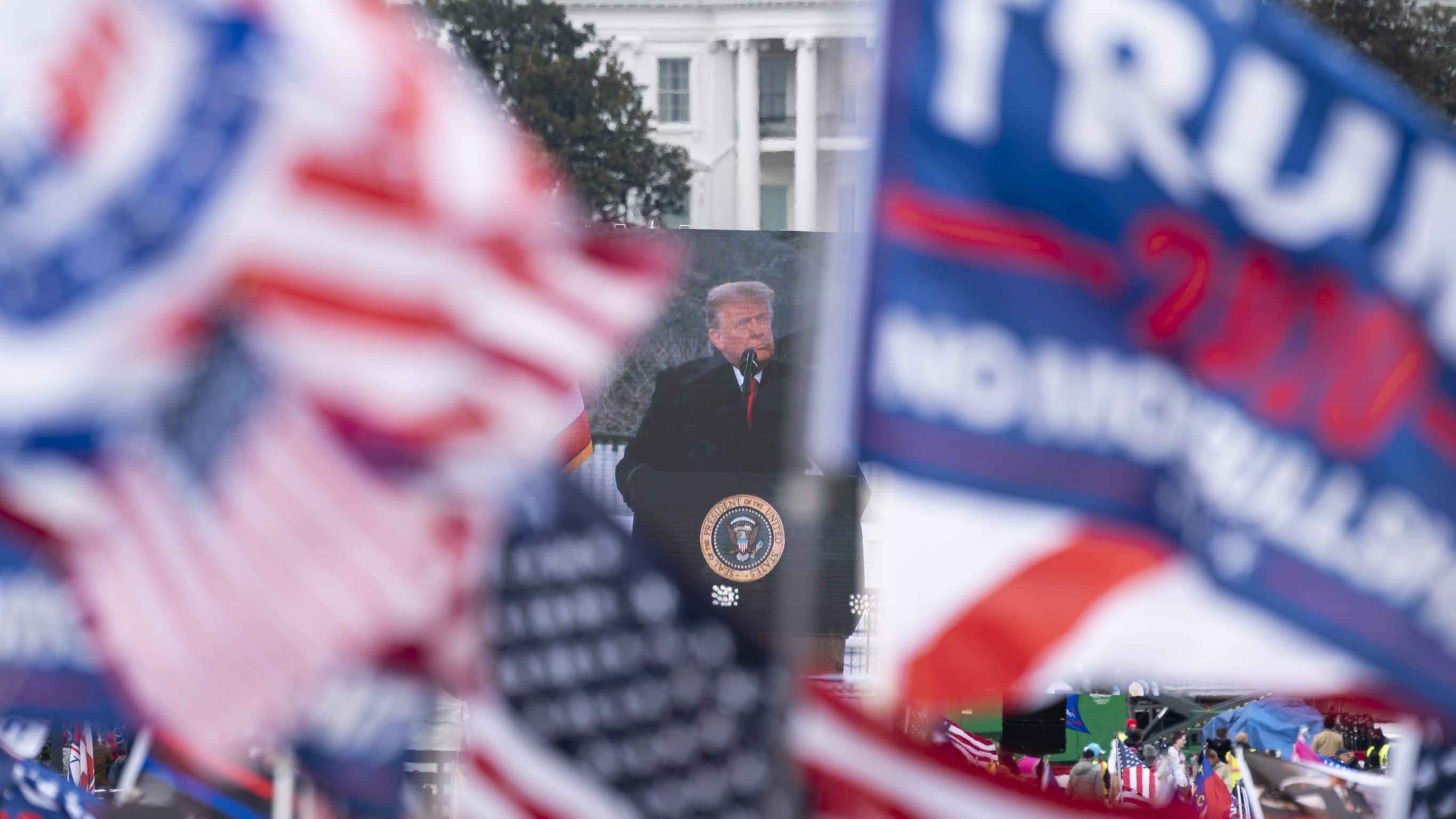A half century ago, I watched Richard Nixon plunge the U.S. into a constitutional crisis. Now I wonder if American democracy will survive Donald Trump.

Former U.S. President Donald Trump as he spoke to supporters from the Ellipse at the White House in Washington on 6 January 2021. (Photo By Bill Clark/CQ Roll Call via AP Images)
On the evening of September 20, 1973, U.S. President Richard Nixon plunged the United States into a constitutional crisis by firing a special prosecutor investigating suspected White House involvement in a burglary of the opposition Democratic Party headquarters.
As a young reporter, I covered what became known as the “Saturday Night Massacre” and was deeply shaken by it. To me, it looked and felt like the Nazi putsch that brought Adolf Hitler to power in Germany in the 1930s, an upheaval that ultimately led to the massive death and destruction of World War Two.
When I got home from work that night, I told my wife and visiting father-in-law that Nixon had hijacked our democracy. That America as we knew it was gone.
My father-in-law, a World War Two veteran who’d seen combat in Europe, mixed me a drink and told me sternly that my fears were groundless. “The American people will never stand for this!” he insisted.
Dr. Bill Weingarten was right. Nixon’s action so angered his fellow Republicans as well as the Democrats — office-holders and ordinary citizens alike — that it energized a bipartisan congressional investigation and impeachment that ultimately led the 37th president to resign from office.
Nixon’s Watergate — Trump’s January 6
There was no widespread rejoicing when Nixon was forced into retirement. Congressman Peter Rodino, a New Jersey Democrat who headed the committee that recommended Nixon’s impeachment, told me afterward that when the decision was taken, he went to his office and wept.
Americans by and large saw it as a sad day in U.S. history but something that had to be done.
To my mind, Donald Trump’s refusal to acknowledge defeat in the 2020 presidential election and participate in a peaceful transfer of power was far worse than Nixon’s wrongdoing.
Five people died in an attack on the U.S. Capitol by Trump supporters on January 6, 2021. The assault was designed to thwart Congressional ratification of Joe Biden’s election as President. Trump continues to undermine the U.S. democratic system of government and the rule of law by spreading the lie that the 2020 presidential election was stolen from him.
Yet most Republican political leaders and millions of ordinary American citizens continue to believe the lie. Why is this?
What happened to the stability that for more than two centuries made America admired and envied by the rest of the world? More important, what if anything can be done to end the current crisis?
Here are some things to think about:
1. A poisoning of the U.S. public information bloodstream
An informed citizenry is essential to self-government. In 1987, the administration of then-U.S. President Ronald Reagan scrapped a 40-year-old government regulation requiring those who use the public airwaves for their own gain — radio and television broadcasters — to fairly present opposing political points of view.
The end of the regulation fostered the proliferation of colorful, highly opinionated radio talk shows and Fox News, most of which reap profits by inflaming their audiences without being fair or balanced.
Mainstream television is not blameless either. During the 2016 presidential race, the then-CEO of CBS Television, Les Moonves, defended the abundant airtime the major networks were showering on Trump. Trump’s candidacy “may not be good for America but it’s damn good for CBS,” Moonves said. “The money’s rolling in, and this is fun.”
Then there have been highly sophisticated efforts by Russia, China, Iran and other U.S. adversaries to spread mistrust and division throughout the country through social media.
Given such a toxic brew, is it any wonder that millions of Americans continue to believe Trump is the victim of the most massive fraud in American history?
2. A blurring of the separation of church and state
America’s Founding Fathers were aware that mixing religion and government can be a recipe for autocracy, strife and bloodshed. Compromise is the lifeblood of democracy. You give a little, I give a little, and we create common ground on which to build a peaceful society.
Religion is by definition a set of strongly held beliefs based on faith rather than reason and thus not susceptible to compromise.
So the Founders insisted on separation of church and state. Indeed, it’s a prerequisite for freedom of religion.
In the last half century, a series of Supreme Court rulings based on the Founders’ intent — chief among them banning prayer in public schools, establishing a woman’s right to abortion, legalizing gay marriage — have angered millions of congregants of Christian churches because the rulings conflict with their beliefs.
This induced many church leaders and politicians to forge an alliance with Trump as their champion and someone who could help reshape courts to roll back those rulings.
3. The biggest chink in democracy’s armor is its susceptibility to passion.
Impassioned citizens tend to vote. But many citizens are apt to be apathetic. Polls suggest that unless the general public can be energized to restore traditional American governance and the rule of law, Biden, if he runs for re-election in 2024, could well lose to either Trump or a politician in his mold.
What might change this equation?
Perhaps the evidence of Trump’s disdain for democracy uncovered by the congressional committee investigating the January 6 attack.
Perhaps widespread alarm at the sharp right-hand turn of the U.S. Supreme Court, whose recent rulings on guns and abortion fly in the face of the views of a majority of the American people according to public opinion polls.
Perhaps a major international crisis that unites the American people behind bipartisan leadership.
Or just maybe the public, which now seems consumed with video games and the lives of celebrities, will start to realize democracy is fragile and it would be catastrophic to lose it.
I’m not optimistic any of this will come to pass.
Three questions to consider:
- Why did Richard Nixon resign as U.S. president?
- What happened in Washington, DC, on 6 January 2021?
- Do you think U.S. democracy is threatened?

Gene Gibbons covered U.S. Presidents Nixon, Ford, Carter, Reagan, George H.W. Bush and Clinton during his career with Reuters and UPI. He was past president of the Radio-Television Correspondents Association and served as a Presidential Debate panelist in 1992 and as a Joan M. Shorenstein Fellow at Harvard’s Kennedy School of Government in 2010. An ex-U.S. Army officer, he once served as press aide to U.S. Vice President Hubert Humphrey. He is the author of the book "Breaking News: A Life in Journalism."
